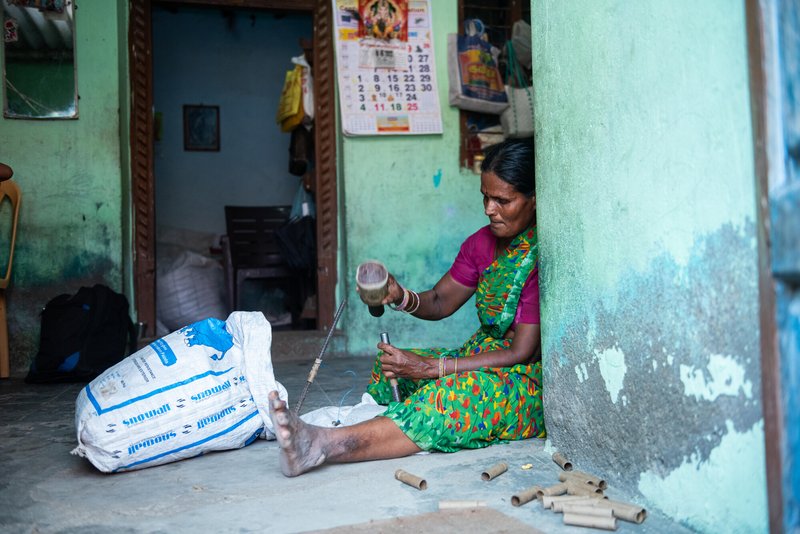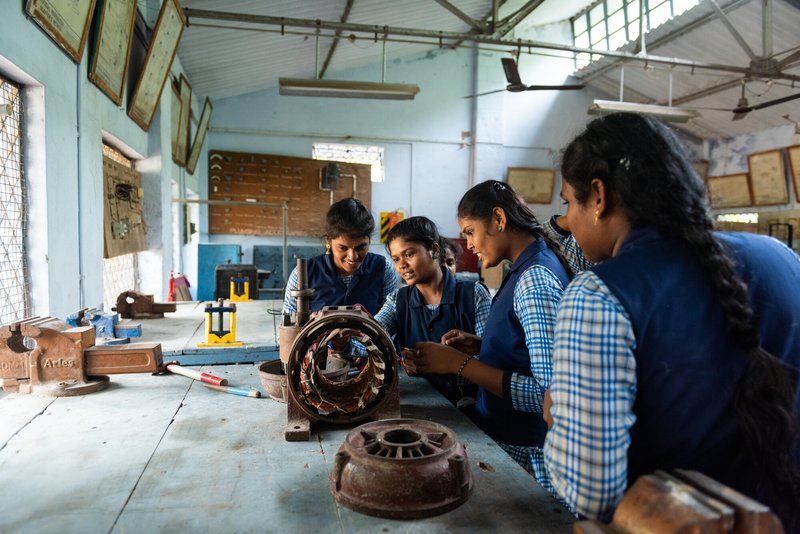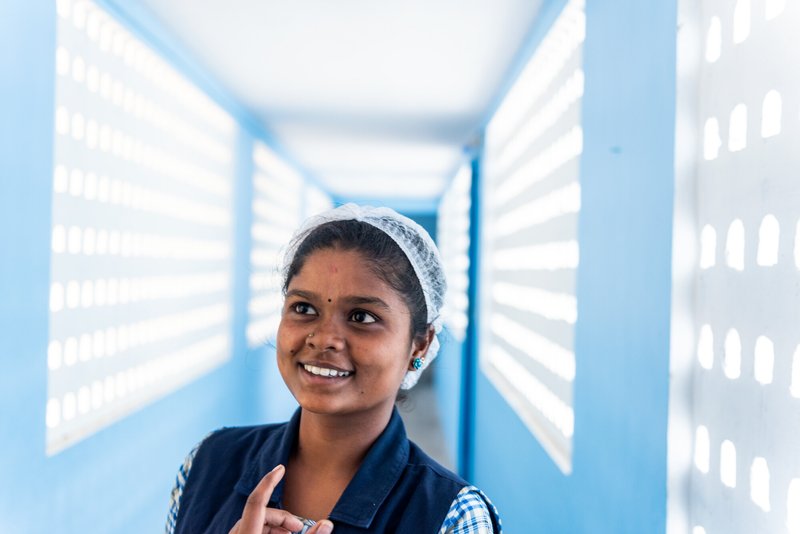Pathways out of poverty: Vocational Training Centres in India
Young people affected by leprosy start their lives with several disadvantages that can make it impossible for them to break out of the cycle of poverty. In India, as in many parts of the world, the stigma attached to leprosy creates enormous barriers. This means that people affected by the disease are often unable to enjoy the freedoms available to others.
They need skills to access job opportunities, but it’s difficult when they may have been forced to drop out of school, or their families can’t afford to pay for further education. This can lead to them feeling more isolated from society, unable to realise their full potential.
Bakkyo is from a remote village in southern India, and is living with disabilities caused by leprosy. She used to work as a labourer, but as the disease affected her hands and feet, it became impossible to do manual work. She and her husband couldn’t afford the rent in in the village where they were living so they moved back to where Bakkyo grew up.
She then started some work rolling firecrackers to try and make ends meet. Making firecrackers isn’t as physically demanding as being a labourer, but Bakkyo’s days are long. She earns around INR 100-150 (£1 - £1.60) per day working from 6am to 6pm.

Stigma and poverty: destroying dreams?
Bakkyo became emotional when she spoke to us about the pressures of trying to earn enough money to provide for her family. She says that during the Covid pandemic things became even worse, as her husband struggled to stay in work. She says, “All the factories were closed and so you could only get one or two weeks of work. It was very tough. With little money, it was difficult to manage.”
Bakkyo’s 18-year-old daughter Nagajothi is also affected by leprosy. Her symptoms were recognised early, at the age of 14, and she was given the cure. But despite this, she still experienced stigma from the community. Friends and even relatives shunned her. Nagajothi was devastated. And as her parents struggled to get by, she feared for her future. Like any teenage girl, Nagajothi had dreams. But with leprosy and poverty stacked against her, she didn’t feel optimistic.
An amazing breakthrough came when Nagajothi was offered the opportunity to study at a Leprosy Mission Vocational Training Centre (VTC). These further education centres provide training for young people affected by leprosy, giving them the skills to get a job that will provide stable employment.
When Nagajothi found out about the VTC, she knew that nothing could stop her from going and she’s now working hard at her course, training to be an electrician. “With this education, I will change the world, I'm telling you,” she said.

Vocational Training Centres – a pathway out of poverty
VTCs teach a variety of courses including banking and insurance, nursing, computer programming, sewing technology, diesel mechanics, , electrical training, motor vehicle mechanics, printing and welding. These courses focus on providing students with hands-on training, which leads to a nationally-recognised qualification. They also focus on equipping students with core life skills such as critical thinking, problem-solving, decision-making, communication, and leadership.
Each VTC has links with local businesses, ensuring that most young people get a job as soon as their courses finish. They also encourage graduates to keep in touch with each other as they develop their careers and feed back on employment practices at the companies they’re working for, ensuring that they’re treated fairly and not discriminated against.
“At first, I chose electrical training as it was a job in high demand but as I continued studying, I started to like it more,” said Nagajothi. “Once when I was visiting home during lockdown, I fixed the lights and a few electrical sockets, and it made me so happy. My mother was also pleasantly surprised. She thinks I did a better job than if someone else had done it. She's very proud of me.”
Nagajothi was also very impressed with how she was able to continue studying during the pandemic. “The teachers gave us training every day via a mobile phone. My studies weren't disturbed,” She said. VTC staff worked hard during lockdown to make sure that their students’ courses weren’t disrupted.

New confidence, new goals
Nagajothi’s dream is to become a self-employed electrician, but she is planning on getting a government job first. “I want to help encourage other young people to get training, particularly young women and others with leprosy too – to show them that this is possible,” she told us.
Bakkyo says, “Nagajothi has changed after studying at the VTC. She is much more confident and happier, and I now believe that she will get a good job.” Bakkyo also hopes that seeing Nagajothi’s success will help break down stigma and encourage their community to be more inclusive of the family again.
Education is a fundamental human right. However, there are over 260 million children around the world who are out of the classroom – many because of disability, poverty or discrimination. Young people like Nagajothi have the potential to soar and with the right support they can. But there are so many more young people like her who are waiting for someone to give them a chance. The opportunities are there, waiting for them.
And you can help them achieve their dreams. With a gift to support a student at a Vocational Training Centre, you can make sure more young people like Nagajothi can break out of the cycle of poverty, growing their confidence and giving them hope. Today, your gift can change someone’s future.